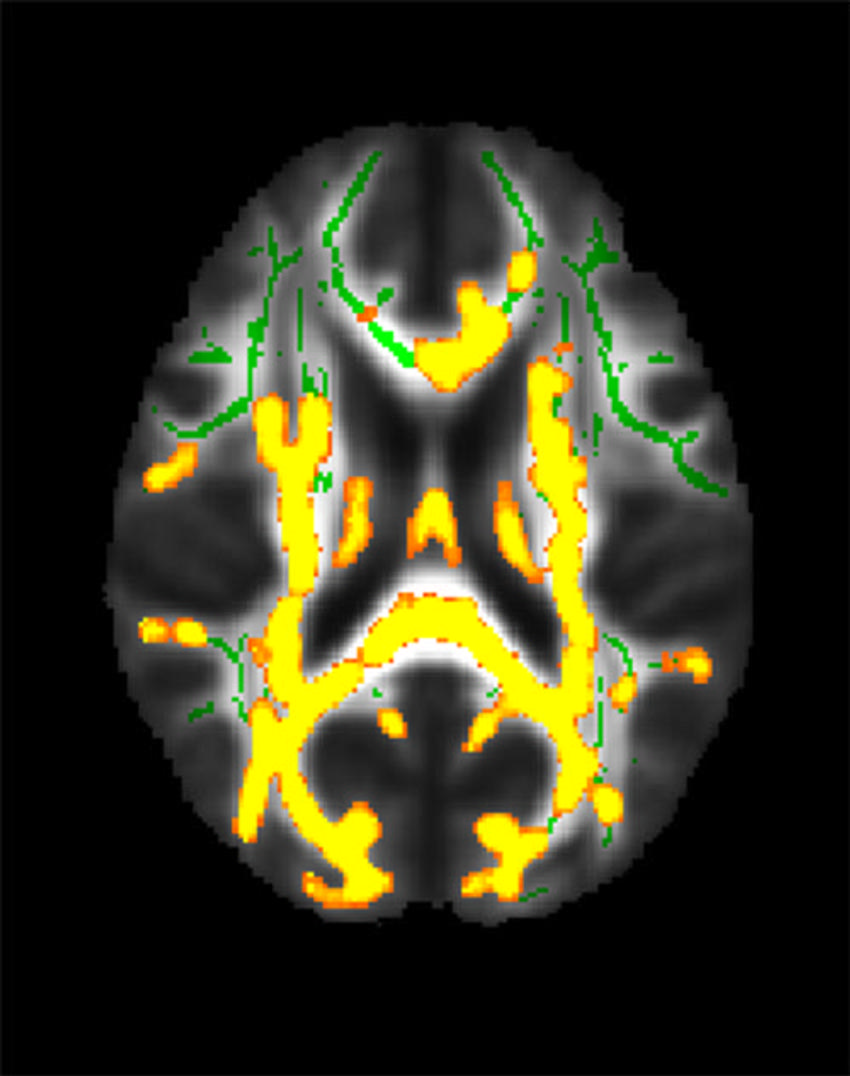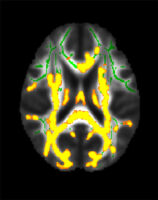
28 Nov RSNA23: WashU Study Finds Link Between Hidden Belly Fat and Alzheimer’s Disease
MedicalResearch.com Interview with:

Dr. Dolatshahi
Mahsa Dolatshahi, M.D., M.P.H.
Post-doctoral research fellow
Mallinckrodt Institute of Radiology (MIR)
Washington University School of Medicine
St. Louis
MedicalResearch.com: What is the background for this study?
Response: Obesity at midlife is recognized as a risk factor for developing Alzheimer disease decades afterwards. However, body mass index on its own does not adequately represent the risks associated with obesity.
In this study, we went beyond BMI and considered anatomical distribution of body fat, including the metabolically active visceral fat in the belly, and showed its association with Alzheimer pathology in the form of amyloid proteins. In addition, visceral fat along with obesity and insulin resistance were associated with thinning of brain cortex, as early as midlife.

This figure shows increased neuroinflammation (yellow colors) associated with higher hidden fat (visceral fat) in the cohort of 54 participants with an average age of 50 years in the brain’s white matter. The green colors are the normal white matter
MedicalResearch.com: Is this visceral fat linked to insulin resistance?
Response: Previous studies have shown that increased visceral fat is associated with increased insulin resistance, a result that was also shown in our analyses. Visceral fat has a higher lipolytic activity and releases fatty acids into the portal vein, affecting hepatic metabolism and insulin resistance. Also, visceral fat produces more inflammatory cytokines, contributing to higher insulin resistance.
MedicalResearch.com: What should readers take away from your report?
Response: The most important takeaways from this study are
i) We need to go beyond body mass index (BMI) to characterize how body fat affects the brain because by using only BMI, we can potentially miss hidden fat (visceral fat around the organs in the belly) that can be more damaging to the body than fat under the skin (subcutaneous fat)
ii) We found that more of visceral fat is linked to increased amyloid, an abnormal protein that causes Alzheimer’s, and increased brain atrophy on PET and MRI brain scans
iii) We found the hidden fat-Alzheimer biomarker connection in persons at midlife (40s and 50s), 15 years on average before the earliest symptoms of Alzheimer’s typically appear.
MedicalResearch.com: What recommendations do you have for future research as a results of this study?
Response: This is a pilot study with a small sample size showing cross-sectional association between body fat and brain health. We are aiming at recruiting 120 participants and doing a longitudinal version of this study. Future study should also address anatomical characterization of body fat, as well as the role of lifestyle-related factors, including dietary habits and physical activity in modifying body fat and brain health.
Disclosures: This study was funded by the National Institute of Health (NIH), under the project number 1RF1AG072637-01 entitled “Neuroinflammation and Alzheimer’s Disease Imaging Biomarkers in Midlife Obesity” and was performed at Washington University in Saint Louis.
Citation: RSNA 2023 abstract:
—————–
The information on MedicalResearch.com is provided for educational purposes only, and is in no way intended to diagnose, cure, or treat any medical or other condition.
Some links may be sponsored. Products are not endorsed.
Always seek the advice of your physician or other qualified health and ask your doctor any questions you may have regarding a medical condition. In addition to all other limitations and disclaimers in this agreement, service provider and its third party providers disclaim any liability or loss in connection with the content provided on this website.
